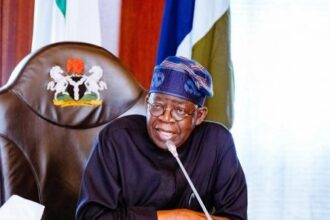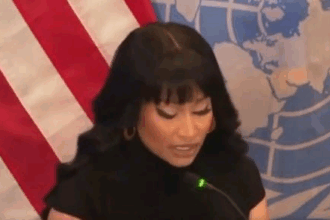Nigeria has made its case for proper representation on the United Nations Security Council.
It said having contributed to at least 41 peacekeeping missions globally and deploying over 200,000 Nigerian troops in UN operations, it deserves a seat on the global security organ.
“It is on this basis that Nigeria continues to call for the reform of the United Nations Security Council to give just representation to Africa permanently for inclusivity and deepening of global peace and security,” said the Minister of Defence, Mohammed Badaru, when he addressed the 79th United Nations General Assembly, in New York, USA, on Sunday.
ATTENTION: Click “HERE” to join our WhatsApp group and receive News updates directly on your WhatsApp!
Badaru spoke at the summit of the Future Interactive Dialogue 2 with the theme ‘Enhancing Multilateralism for International Peace and Security.’
The Security Council is one of the six principal organs of the United Nations.
Its 15 permanent members are charged with ensuring international peace and security, recommending the admission of new UN members to the general assembly, and approving changes to the UN Charter.
The UNSC also establishes peacekeeping operations, enacts international sanctions and authorises military operations.
At the summit, Nigeria’s defence minister said, “Nigeria has remained unequivocal in its commitment to international peacebuilding and security, since the first engagement of its troops in the Congo in 1960.
“To date, Nigeria has contributed to 41 peacekeeping operations worldwide, with over 200,000 Nigerian troops serving in UN peacekeeping missions.
“Under the regional and sub-regional cooperation, Nigeria has been involved in peacekeeping operations in field missions in Cote d’Ivoire, Guinea-Bissau, The Gambia, Liberia, Mali, Sudan and Sierra Leone, among others, and has contributed a lot in terms of finance, logistics, troops and civilian experts, making her one of the most significant African troops and police contributors to the United Nations missions.”
He argued that this qualifies Nigeria and Africa for a just representation “on a permanent basis for inclusivity and deepening of global peace and security.”
Badaru stressed the importance of building professional African armies to combat terrorism on the continent and urged for operationalising the African Standby Force.
He also highlighted the need for comprehensive strategies to tackle transnational crime and illegal arms trafficking, particularly in the Sahel region.
“We recognise the need for Africa to build strong and professional armies, to, among other things, defeat terrorism.
“Nigeria, calls for the operationalisation of the African Standby Force, and the provision of requisite support and resources to ensure the upgrade, take-off, and effectiveness of a centre of excellence in Africa on issues of counter-terrorism.
“We reiterate the call to strengthen regional and sub-regional cooperation, build capacities of member states, promote cooperation and understanding, as well as defuse tensions, and seek peaceful settlement of disputes to resolve conflicts, especially in the Middle East and Ukraine,” Badaru asserted.
The minister restated Nigeria’s commitment to combating transnational organised crime.
He also emphasised the urgent need for comprehensive strategies that include prevention, early detection, protection, and law enforcement to address the rising alliances between bandits and terrorists.
“We must scale up our efforts,” he added, highlighting the alarming trend of kidnappings for ransom and acts of piracy.
Badaru urged the international community to intensify efforts to control the proliferation of small arms and light weapons in conflict zones, particularly in the Sahel region.
READ ALSO: Shettima Arrives New York for 79th UN General Assembly
He warned that unrestricted access to illicit arms by non-state actors exacerbates insecurity and instability, saying, “The time for action is now.”
“We must scale up efforts in addressing transnational organised crime and related illegal financial flows through comprehensive strategies, including prevention, early detection, protection, and law enforcement, especially in the wake of the emerging alliance between bandits and terrorists, including kidnapping for ransom and acts of piracy.
“We seize this opportunity to urge the international community to renew efforts to stem the tide of small arms and light weapons in conflict, especially within the Sahel region where unfettered access by non-state actors to illicit arms and light weapons continues to foster insecurity and instability,” he said.
Badaru concluded his address by reaffirming Nigeria’s dedication to supporting UN efforts in combating terrorism and promoting global peace.
In his presentation, the Minister of Foreign Affairs, Yusuf Tuggar, called on global leaders to prioritise sustainable development, particularly in Africa.
Tuggar spoke at the Summit of the Future, highlighting the statistic that only 16 per cent of Sustainable Development Goals are on track for completion by 2030, underscoring the urgent need for enhanced international cooperation.
Tuggar urged developed nations to fulfill their commitments to support the global South, emphasising that failure to meet the SDG targets should prompt an extension of the 2030 deadline.
The minister said, “The SDG Index estimates that only about 16 per cent of the SDG targets are on track to be achieved. We must, therefore, ensure that today’s adoption of the Pact for the Future is backed by a real willingness to fulfil outstanding commitments.
“With the remaining 84 per cent of the SDG targets for 2030 yet to be achieved, countries in the global North must do more to support sustainable development in the global South.
“We are optimistic that these targets can be met if commitments are backed by action. However, in the event we fall short of achieving the SDG targets by 2030, we strongly believe that the deadline should be extended.”
He argued that systemic inequalities and historical imbalances had left many African nations vulnerable and struggling to achieve their development goals.
Among his key proposals, Tuggar called for a permanent seat for Africa on the UN Security Council, reflecting the continent’s growing influence and the necessity for equitable representation.
He also advocated a complete overhaul of the international financial architecture to ensure transparency and inclusivity, alongside comprehensive debt relief measures to alleviate the economic pressures faced by African countries.
“We must, therefore, take action-oriented measures to engender the following: Reform of the UN Security Council to ensure a permanent seat for Africa; reform of the international financial architecture to promote an inclusive, non-discriminatory and transparent international trading system, as well as to implement comprehensive debt relief measures;
“Fulfilment of all commitments under the Addis Ababa Action Agenda, particularly to facilitate sustainable financing for development; support for local indigenous production and export from Africa; strengthening of measures to ensure timely repatriation of illicit financial flows and assets,” the minister noted.
In a plea, he outlined essential steps for sustainable development, including robust support for local production and exports, timely repatriation of illicit financial flows, and the establishment of a UN Framework Convention on International Tax Cooperation to combat tax evasion.
Addressing climate change, Tuggar stressed the importance of a fair transition away from fossil fuels, while insisting on the principle of Common But Differentiated Responsibilities.
He called for substantial financial assistance, proposing an annual allocation of $500 billion to the Global South as part of the UN Secretary-General’s SDG stimulus proposal.
Tuggar also emphasised the need to bridge the digital divide, advocating for technology sharing and capacity building to ensure that no one is left behind.
Furthermore, he called attention to the necessity of establishing a common understanding of cryptocurrency to mitigate its potential for economic disruption and crime.
In closing, Tuggar reaffirmed Nigeria’s commitment to the 2030 Agenda for Sustainable Development and called for immediate, collective action through the Pact for the Future.
He stressed that only through united efforts can the international community tackle the pressing challenges facing Africa and the global South.
AFP


